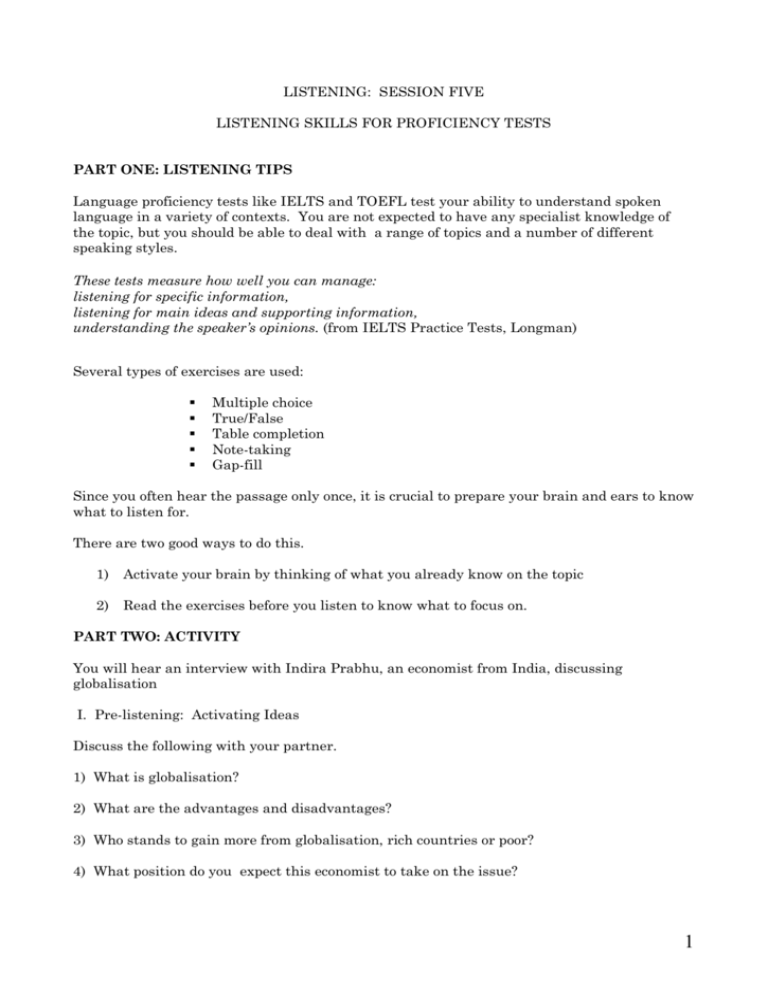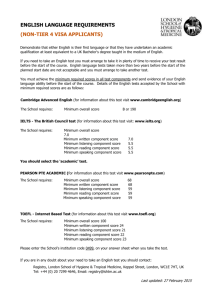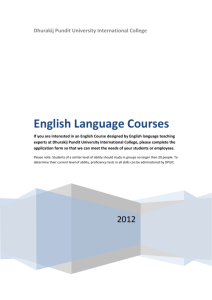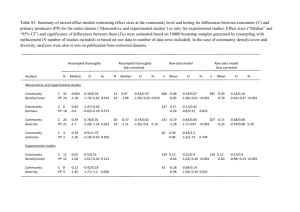LISTENING: SESSION FIVE
advertisement

LISTENING: SESSION FIVE LISTENING SKILLS FOR PROFICIENCY TESTS PART ONE: LISTENING TIPS Language proficiency tests like IELTS and TOEFL test your ability to understand spoken language in a variety of contexts. You are not expected to have any specialist knowledge of the topic, but you should be able to deal with a range of topics and a number of different speaking styles. These tests measure how well you can manage: listening for specific information, listening for main ideas and supporting information, understanding the speaker’s opinions. (from IELTS Practice Tests, Longman) Several types of exercises are used: Multiple choice True/False Table completion Note-taking Gap-fill Since you often hear the passage only once, it is crucial to prepare your brain and ears to know what to listen for. There are two good ways to do this. 1) Activate your brain by thinking of what you already know on the topic 2) Read the exercises before you listen to know what to focus on. PART TWO: ACTIVITY You will hear an interview with Indira Prabhu, an economist from India, discussing globalisation I. Pre-listening: Activating Ideas Discuss the following with your partner. 1) What is globalisation? 2) What are the advantages and disadvantages? 3) Who stands to gain more from globalisation, rich countries or poor? 4) What position do you expect this economist to take on the issue? 1 II. VOCABULARY FOCUS Here are some expressions you will encounter in this interview. First mark the stressed syllable in each, then explain their meaning with your partner. a. developing countries b. developed countries c. job losses d. moving abroad e. unemployed f. downsides g. h. i. j. k. l. m. poverty child labour sweatshops goods average worker know-how cheaper labour n. o. p. q. a scapegoat manufacturing services value added III. Task: You will need to decide if the following questions are True or False. If it is False, you must correct it. Instructions: 1) Read through the questions before you listen. 2) Then as you listen, take notes on a separate piece of paper to help you correct the statements which are false. 3) You will then have a few minutes to complete the exercise Part A 1. The main idea of this interview is to discuss the downsides of globalisation. Notes Corrected statement 2. The economist argues that globalisation increases poverty in the world. Notes Corrected statement 3. She argues that globalisation can be a benefit to poor countries. Notes Corrected statement 4. Problems like child labour and people forced to work in sweatshops is a problem that has been around for a long time. Notes Corrected statement 5. Globalisation is too often used as a scapegoat for social problems in the country Notes Corrected statement 2 6. She believes that globalisation can only bring benefits to poor countries. Notes Corrected statement 7. Western companies tend to set prices arbitrarily on goods from producing countries. Notes Corrected statement Part B 1. Globalisation is more dangerous for people in developed countries. Notes Corrected statement 2. People in the West expect to work less and earn more. Notes Corrected statement 3. Notes The main reason for job losses is jobs moving abroad. Corrected statement 4. The standard of living of an unemployed person in Germany is the same as that of the average worker in the developing world. Notes Corrected statement Part C 1. Poor countries are often called “decaying economies” because they are losing their competitive advantage. Notes Corrected statement 2. Poorer countries are less competitive because they have cheaper labour. Notes Corrected statement 3. The economist believes that an economy can be based only on services. Notes Corrected statement 3 4. She advises developed countries to focus on innovation. Notes Corrected statement PART THREE: LANGUAGE WORK A) Expressions of frequency Look at the sentences 1-7 from the listening. What do the words in italics mean? 1. People talk about the benefits of globalisation , but they hardly ever consider its downside. 2. As a rule, poorer countries benefit when they open up to foreign trade. 3. Most of the time, western firms dictate prices and take advantage of producing countries. 4. The producers rarely see the larger part of the value added. 5. The reason for the job losses in the US for example is generally labour-saving efficiencies. 6. But a driving force for economic growth like that powered by the IT boom only seldom appears. 7. Interviewer: But companies do moved abroad. Economist: From time to time, but it doesn’t happen as often as people think. Put these expressions of frequency in order from most often to least often 1. 2. 3. 4. 5. 6. 7. 8. hardly ever from time to time seldom most of the time rarely as a rule generally now and again B). Expressions with used to Used to can be used to express habits and routines. Match examples of used to in sentences a-c to their meanings in the box. Meaning Verb form 1) become familiar 2) a past habit or state that no longer happens 3) be familiar with something a) Think of the social conditions which used to exist in early US and UK factories. b) People in the West have all got used to working less and earning more. c) At the moment, people are used to buying consumer products from the East at low prices. What form of the firm follows each example of used to? Complete the table above. 4 Rewrite the following sentences using a form of used to. Be sure to use the correct verb form! a) In the past, everyone wore suits and ties to work. _________________________________________________________________________________ b) When Markus first came to the UK, he found driving on the left difficult. _________________________________________________________________________________c)I don’t have much experience using computers. _________________________________________________________________________________ d)I found it hard to adapt to implementing the new methods. _________________________________________________________________________________ e)Isn’t that the house you once lived in? _________________________________________________________________________________ C) YOUR TURN Take turns being the interviewer and the economist (3 minutes in each role) . Try to ask questions and give answers that are similar to those in the original interview. ASSIGNMENT SIX: PRACTICE WITH LANGUAGE TESTS Task: You will do listening exercises from three different internationally-recognized language proficiency tests. Go to: http://www.examenglish.com/ Click on ONE of these three links and then answer these questons: Do the exercises, then check your answers. How many did you get right? What problems did you have? Do you understand your mistakes? Print out your results. Bring printed copy to next class session. I) IELTS Click on IELTS International English Language Testing System listening TOEFL® Test Of English as Foreign Language listening, II. TOEFL Click on III. CAMBRIDGE FIRST CERTIFICATE Click on FCE First Certificate in English (B2) listening, 5




